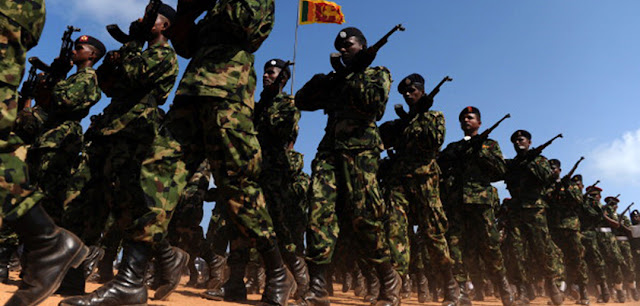 |
| Is it only about soldiers and military hardware? |
The word brings to mind guns and barricades, soldiers and war (in the immediate past, lived through or imminent). That’s natural in a land where several generations have had guns and bombs in-their-faces, literally and figuratively. Natural also in a world that has become small courtesy of communication technology and therefore has war delivered to the palm, so to speak, or obtained with a swipe.
It is not surprising that ‘national security’ has mostly been associated with the protection of the state or rather the incumbent government, even though it is frequently tagged with ‘the people’ and ‘the nation’. Is security about these things alone, though?
The word comes from the Latin ‘Securus’ meaning ‘free from care’ and evolved through the Latin word ‘Securita’ and the Old French ‘Securite’ to ‘Secure’ in English and ‘Security’ in late Middle English, so the dictionaries tell us. Essentially it refers to a state of being secure and free of worry. Now this is not just about protecting territory, national assets and citizens from armed ‘subversion’ from within or without. It is about obtaining and protecting a decent, worry-free, healthy, wholesome lifestyle for all citizens.
Like most key words in matters of the state, ‘security’ can and should be all-encompassing (like ‘environment’ or ‘economy’ for instance). It offers a window that opens us to all sectors: education, health, nutrition, environment, sustainability and basic freedoms even as it speaks to national boundaries and resources or the general safety of people and property.
There are questions that those who write manifestos and/or those who want power need to address: What is security? Are we secure? If we are not, how do we go about obtaining national security?
If we were to take a comprehensive view of things, as we should, then we would have to conclude that insecurity is sadly a constant; well, at least into the foreseeable future. There are imponderables (e.g. the price of oil, the maverick and destructive nature of US foreign policy and military ‘prerogatives,’ trade wars and a development model that pays lip service and nothing more to the health of the planet). Sri Lanka is a prisoner of agreements that contravene national interest but were signed under duress or out of ignorance or servility. We swallowed the development lie, compromised food security, sneered at technologies that were developed over centuries, placed trust on crooks, brigands, murderers, colonial slaves and such to run our affairs, and played a key part in the sustained development of impoverishment on all fronts.
Through it all, we have collectively refused to recognize the greatest insecurity of them all: that which is resident in our minds and prevents us from recognizing resources and potentials while persuading us to allow others to imprint in our consciousness their versions of our realities.
Security is not only about the ‘right now’ and certainly not about protecting the lifestyles and positions of privilege of the few. It is not about safeguarding systems made to rob, cheat, hoodwink, insult, humiliate and impoverish people.
A war situation understandably pushes a lot of these issues to the back-burner, but even in such situations these cannot be forgotten. Perhaps the tragedy has been that even when ‘war’ was not a problem, these matters are not considered important. Twenty five years go, the then US Ambassador to Sri Lanka and the Maldives, Teresita C Schaffer ominously stated, ‘your (Sri Lanka’s) food security lies in the wheat fields of North America.’ Sure, if we had the bucks and if we had options should wheat prices go through the ceiling; what USAID, which was essentially writing the country’s agricultural policy at the time, advocated was to grow gherkin and baby corn instead of rice.
Schaffer, tellingly, is described as ‘an expert on economic, political, security, and risk management trends’ in South Asia and now serves as a senior adviser to McLarty Associates, a Washington-based international strategic advisory firm.
That’s the USA doing what’s in her interest. The tragedy is that we’ve been happy to just tag along, not just in the agriculture sector but the overall paradigm of development which is essentially a recipe for continued underdevelopment and maldevelopment.
National security is about intelligence (yes, more than than military hardware). National security means nothing if food security is ignored or compromised. National security is nothing if there’s no security against climate change. National security is a failure if the dignity and self-respect of all citizens is not assured. National security is nothing if people have to second guess themselves before expressing opinions, nothing if people cannot live the lifestyles that give them meaning, nothing if laws and regulations can be bent by the powerful, nothing if institutions encourage wrongdoing and systems offer refuge to wrongdoers.
National security, most importantly, is bound to be a grotesque proposition if there’s no discussion and agreement on what ‘nation’ really means.
Over to you, Messers Nagananda Kodituwakku, Rohan Pallewatte, Gotabhaya Rajapaksa, Patali Champika Ranawaka, Ranil Wickremesinghe, Maithripala Sirisena and any other individual entertaining hopes of becoming the next President of Sri Lanka.
Malinda Seneviratne is a political analyst and writer. malindasenevi@gmail.com. www.malindawords.blogspot.com

0 comments:
Post a Comment